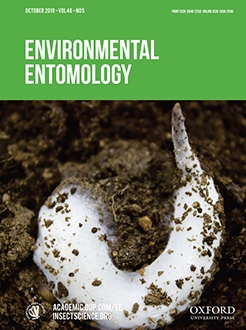Arthropod food webs can be indirectly impacted by woody plant invasions, with cascading consequences for higher trophic levels.There are multiple bottom-up pathways by which invasive plants can alter food webs: aboveground interactions based on plant-herbivore associations and below-ground at the interface of leaf-litter and soil food webs. We compared arthropod community composition in these two food web dimensions in a New York forest that has been heavily invaded by nonnative Japanese barberry. Using two sampling protocols, we compared arthropod community composition on Japanese barberry shrubs to multiple species of native host shrubs and then compared leaf-litter arthropod assemblages between forest patches with exceptionally high Japanese barberry densities and those with relatively little to no Japanese barberry present. Fitting with trends in other woody shrub invasions, arthropod species richness was significantly lower in the leaf litter around Japanese barberry and on Japanese barberry plants themselves. Although overall arthropod abundance was also significantly lower on and in the leaf litter around Japanese barberry than on and around native shrubs, total biomass did not differ due to the taxa associated with Japanese barberry tending to be larger-bodied.We observed a dramatic reduction in predatory arthropods in response to both bottom-up pathways, particularly among ants and spiders. Our results show that Japanese barberry-invaded habitats may be experiencing trophic downgrading as result of lower numbers of generalist predators like spiders and ants, which may have rippling effects up the food web to insectivorous animals and their predators.
How to translate text using browser tools
28 August 2019
Invasive Japanese Barberry, Berberis thunbergii (Ranunculales: Berberidaceae) Is Associated With Simplified Branch-Dwelling and Leaf-Litter Arthropod Communities in a New York Forest
Robert E. Clark,
Chad L. Seewagen
ACCESS THE FULL ARTICLE
It is not available for individual sale.
This article is only available to subscribers.
It is not available for individual sale.
It is not available for individual sale.

Environmental Entomology
Vol. 48 • No. 5
August 2019
Vol. 48 • No. 5
August 2019
above-ground interaction
arthropod
below-ground interaction
food webs
invasive species




